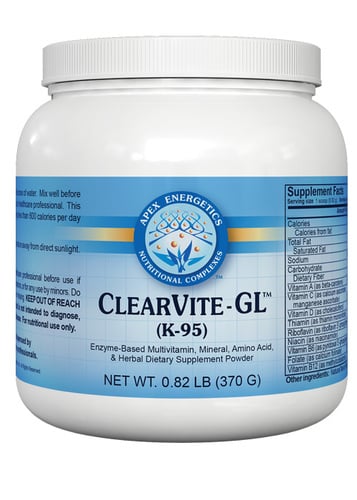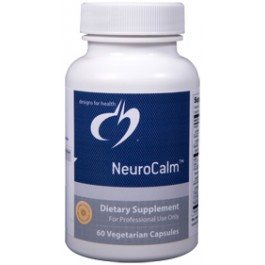
Product Description:
ClearVite-GL™ (K95) is based on on our popular ClearVite™ formula and is designed to offer gastrointestinal and metabolic support.* This formula...
By Gene Bruno, MS, MHS – Dean of Academics, Huntington College of Health Sciences.
 Smart Supplementation™ is a free series of educational literature created by Huntington College of Health Sciences (HCHS) as a public service. Although copyrighted, it may be freely photocopied and distributed, but may not be altered in any way. Smart Supplementation™ is not intended as medical advice. For diagnosis and treatment of any medical condition, consult your physician.
Smart Supplementation™ is a free series of educational literature created by Huntington College of Health Sciences (HCHS) as a public service. Although copyrighted, it may be freely photocopied and distributed, but may not be altered in any way. Smart Supplementation™ is not intended as medical advice. For diagnosis and treatment of any medical condition, consult your physician.
The essential amino acid L-Tryptophan has an extremely successful history of clinical use in treating depression and anxiety. As a sleep inducer, it preceded the currently popular supplement, melatonin, and almost everyone who used it got excellent results. Many women also found it to be particularly good at reducing the emotional symptoms of PMS. As a matter of fact, L-Tryptophan was probably the single most effective supplement that my wife ever used for PMS. Great stuff, L-Tryptophan.
Fitness benefits too
Bodybuilders and other athletes have also enjoyed the benefits of this amino acid. For example, a study involving L-Tryptophan resulted in an increase in the levels of growth hormone released from the pituitary. (Growth hormone (GH) is released by the pituitary gland in the brain in response to sleep, exercise, fasting, hypoglycemia and other factors.) GH is a protein anabolic hormone having many functions including maintaining the immune system, stimulating muscle growth through amino acid sparing and promotion of amino acid transport into muscle cells, and burning fat. Another experiment cited the ability of this nutrient to increase the tolerance for discomfort and fatigue during strenuous exercise, permitting performance for a longer time.
How it works
The reason that L-Tryptophan was able to produce all of the aforementioned benefits, is that the body converts it into the neurotransmitter serotonin. Actually the body first converts it into 5-Hydroxy-L- Tryptophan (5-HTP), which is then converted into serotonin (and then sometimes to to melatonin), which then does all the wonderful things attributed to L- Tryptophan.
The late, great L-Tryptophan
Unfortunately, in 1989 L-Tryptophan was removed from the market following multiple reports of illness and a few deaths that were linked to a single batch of this amino acid which was produced by a Japanese raw material supplier. Due to poor quality control procedures, a contaminant was able to enter the batch, adversely effecting a sensitive fermentation process involved in the manufacture of the amino acid. The result was that a chemical analog of L- Tryptophan was produced which looked like L-Tryptophan, but was not actually L- Tryptophan. It was the analog that caused all the problems. Sadly, L-Tryptophan was blamed, and this valuable amino acid was removed from the market (although it can still be obtained through prescription...an interesting development).
The resurrection of L-Tryptophan (sort of)
Since L-Tryptophan’s removal from the market, consumers have had to forego all of its benefits for years. Due to the chemical analysis of the herb Griffonia simplicifolia, however, all that has changed. Remember the 5-HTP that is the intermediate between tryptophan and serotonin? Guess what? Griffonia simplicifolia naturally contains significant quantities of 5-HTP.
Theoretically, 5-HTP should be as good as, or even better than, L-Tryptophan since it is one step closer to being converted to serotonin. Of course theory is all well and good, but is there any proof? Yes! Clinical data indicates that most if not all of the benefits realized by supplementing with L- tryptophan are translatable to 5-HTP. That is to say that 5-HTP can verifiably effect depression, anxiety, sleep, and...yes, even growth hormone release. Animal studies indicate that 5-HTP is actually capable of causing a release of GH. Hallelujah! Because of 5-HTP we can now enjoy the serotonin benefits that L-Tryptophan used to give us.
Dosage data
So how much 5-HTP do you need to take to get the benefits? Here’s more good news: An efficacious dose of L-Tryptophan was 500 mg - 1500 mg—but an efficacious dose of 5-HTP is a mere one-tenth of that amount, 50 mg - 150 mg. These doses can be obtained in a Griffonia simplicifolia supplement that is standardized for 10% 5- HTP. For example, 500 mg of Griffonia would provide 50 mg of 5-HTP.
Of course individuals differ, and some people may find that a higher or lower dose is required for their personal needs. In any case, I think the world will be a better place now that 5-HTP is available. In any case, I know my wife will be happy (and me too)!
Read information about Designs for Health product 5-HTP Synergy

ClearVite-GL™ (K95) is based on on our popular ClearVite™ formula and is designed to offer gastrointestinal and metabolic support.* This formula...
